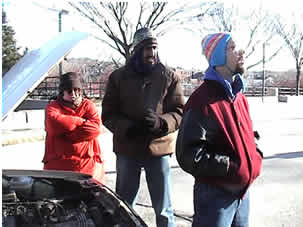
Home is Where the Art Is
Written by Lucy Lincoln Morrison | Posted by: Anonymous
The recent re-release of "E.T.: The Extra-Terrestrial" sparked a torrent of critical re-examination of the film, largely revolving around the theme of a quest for home. On a more modest screen, Ravi Jain, a 2001 graduate of MassArt and a Boston-based conceptual artist, has developed what he calls an "Internet-friendly" sitcom, "Three-Abreast." The action is centered in the Jamaica Plain home Jain created with roommates Sarah Shreeves and Brian Pearson.
Three episodes of "Three Abreast" premiered at the Coolidge Corner Theatre on March 17th: "The Blizzard," "The Prize Winning Tomato," and "Locked in the Basement."
"Three-Abreast" was Jain’s senior thesis project at MassArt, and the episodes combine the standard sitcom viewing experience (sans commercials) with Web content, letting viewers modify their viewing experience based on their interests.
The marriage of entertainment and Web-content is intentional. "I knew if I was making a Web-based program, then it had to have content to provide a rationale for existing on the Web," Jain explains. The link to Jain’s Web content is called The Comedy Extender. A quick click of the Comedy Extender allows a viewer to see alternative endings that were filmed for a given scene. Or, you can dive into the trivia tidbits and background information provided by Jain along the way. In an episode that features the roommates installing a new stereo, the viewer may click a link to the history of surround sound.
Accepting that Internet surfers have shorter attention spans and inconsistent download waits, each episode unfolds over the course of about eight minutes. In "The Blizzard," the roommates face a winter storm that knocks out their heat; in "Prize Winning Tomato," Ravi must replace Sara’s favorite salad fixin’ before she comes home from work; and in "Locked in the Basement," the three roommates are (you guessed it) locked in the basement during a Red Sox game.
Jain is, first and foremost, playing it for laughs. The crowd pleasers are in full force—visual gags, spit-takes, pratfalls, and even a talking housecat. Jain is unconcerned that "Three-Abreast" does not speak to higher artistic or cultural truths. "When people see it, they might be looking for commentary because there’s this belief in the art community that you have to have an agenda, but sitcoms are self-mocking by nature. And everything is so derivative, notoriously so in sitcoms, that you are always referring to something else, and sometimes that plays as satire and sometimes it’s just funny."
There is an infinite tradition of artists placing themselves directly into their narrative. Jain says that as a child, he always envisioned his life as a sitcom. "I was really into TV Guide," he explains. "I used to be fascinated by how the networks programmed different shows against each other — what are they going to run against "The Bionic Woman" and why — things like that. Some days, I would also try to map out how to get from 5:00 a.m. to 3:00 a.m. watching television, which was really tough in the pre-cable days because there was this barren wasteland after 1:00 a.m."
Three-Abreast evokes the sitcom canon of the 1970s and 1980s. In the opening sequence credits, Pearson is belly flopped across his bicycle seat, sailing down a hill with his feet flying behind him, much like Tom Hanks before his thank-you-members-of-the-Academy phase.
Jain also borrows liberally from films. The climax of the "Prize Winning Tomato" takes place in a Jamaica Plain grocery store, where Jain and Pearson are looking for a replacement tomato when Shreeves arrives. Anxiety and determination etched all over his face, the theme music from "Platoon" swells as Jain, in slow motion, races towards the checkout counter.
Jain is a graduate of Oberlin College, where he created his interdisciplinary major that combined film, video, and computer sciences. Following a stint as a graphic designer at a Cambridge public-relations firm, he spent three years in Sweden, convinced that it would be easier to bridge the creative and corporate world outside the US. His time in Sweden was formative in that he was exposed to Scandinavian broadcast and design, and more importantly, a series of difficult living arrangements. "It is really difficult to find housing in Stockholm. People sign up for apartments with the government and are on these waiting lists for years. It’s so bad that 10 year olds sign up for apartments, figuring their number might come up by the time they turn 21. I was literally moving every six months, illegally subletting from people. I felt like The Fugitive."
Returning to Boston and enrolling at MassArt, he answered an ad in the paper and moved into a Jamaica Plain Victorian with Shreeves and Pearson. "We got along so well, it was so great having a home, and I just felt really grounded," he says.
The three spent a good deal of time at the James Gate Pub (the Central Perk of "Three-Abreast"), and it was there that Jain first broached the idea of the sitcom. "It wasn’t hard to convince them to do it, but it’s been hard to convince them to keep doing it, because it takes about two months to shoot each episode," Jain says. "Brian wants to be killed off."
Does Jain want to keep doing it? He’s got eight episodes completed and will be posting a new episode every two weeks—and taking the old ones down. He is intentionally following a broadcast model to encourage viewers to keep checking in. He also can’t afford to have all of his episodes posted at once. Jain doesn’t expect to make money on the site, but he is eager to have Apple Computer, Inc. (or some other entity with deep pockets) take over hosting. Apple seems the best fit, since all of the technology used to videotape, edit, and post content is Apple’s.
Jain hasn’t thought much about what to do next since this project, which was well-received as his MFA thesis, has been all-consuming. He also has no delusions about making a profit on Three-Abreast.com. The market for Web-based original content is small. "Finding someone else to host the site might be an interesting way of minimizing his costs. The real issue for people that want to make money doing Web entertainment is, what’s the revenue model?" says Julian Chu, Executive Consultant with IBM’s Institute for Business Value and Change Consulting. "It’s hard enough to get people to pay attention, much less to pay for it."
However, Chu believes that Jain is clearly on target with entertainment trends by combining programming and content. "This type of format is what we’re going to see on TV," Chu explains. "CNN is already starting to have that kind of interface, with varying types of information crowding the screen. There’s a debate raging about whether the PC will take over the TV or vice versa. But what it really comes down to is, where do you want to be in your home? If I’m working on my computer, I’m in my study. If I’m watching television, then I’m on my couch. There will be overlap, but it’s still not clear that people want to sit in their office and watch movies—or balance their checkbooks and do research over the TV."
Jain doesn’t profess to make overarching cultural statements with "Three-Abreast," but his project is at the crux of a variety of artistic and commercial challenges. The paradox of his medium is that the more people visit the site, the more challenging it is for him to foot the costs of his success. And by combining content with programming, "Three-Abreast" embodies the trends that will force us to decide where we will seek information and entertainment. Do we go into our study, do we go into the living room, or is it irrelevant, because we’re all hopelessly locked in the basement?
For more information, visit www.three-abreast.com.











